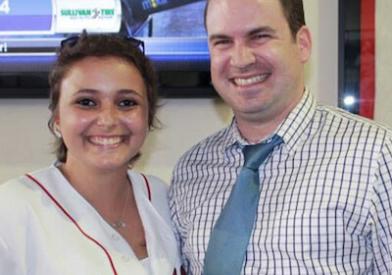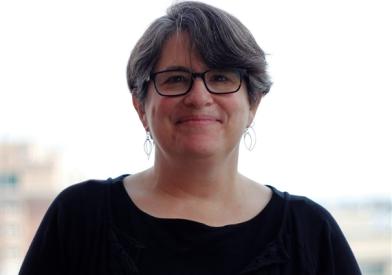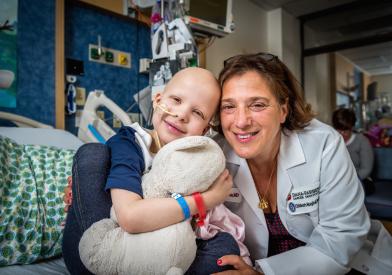The Hematopoietic (Stem) Cell Transplant Program at Dana-Farber/Boston Children's Cancer and Blood Disorders Center is one of the largest and most experienced pediatric stem cell transplant programs in the world. Our integrated pediatric hematology/oncology program through Dana-Farber Cancer Institute and Boston Children's Hospital provides — in one specialized program — all the services of both a leading cancer center and a pediatric hospital.
Pediatric hematopoietic cell transplant, also called stem cell transplant or bone marrow transplant, is used to treat many types of conditions affecting children and young adults. While traditionally used to treat cancers and blood disorders, hematopoietic cell transplants are increasingly being used to treat a growing range of conditions, including metabolic diseases, genetic immunodeficiencies, and other disorders.
Our Expertise in Pediatric Stem Cell Transplant
We perform more than 100 stem cell transplants each year for children and young adults with many types of cancer and other conditions. Our pediatric stem cell transplant team includes some of the world's most experienced and knowledgeable pediatric stem cell transplant doctors and scientists, as well as nationally recognized pediatric specialists.
Currently, we have 15 credentialed transplant specialists on staff — all Harvard Medical School faculty. Our physicians include past and present leaders from the American Society for Blood and Marrow Transplantation, Pediatric Blood and Marrow Transplant Consortium, and the Center for International Blood and Marrow Transplant Research.
Our transplant nurses, all of whom are certified pediatric oncology nurses with transplant-specific training, work collaboratively with physicians and other team members to coordinate and oversee each child's treatment plan.
Why Choose Our Pediatric Stem Cell Transplant Program
Dana-Farber/Boston Children's Pediatric Stem Cell Transplant Program has performed nearly 1500 stem cell transplants to date - making us one of the largest and most experienced pediatric stem cell transplant programs in the world. We see to it that your child receives the highest level of care before, during, and after transplant to ensure the best results.
We regularly participate in national outcomes reporting and have played a major role in developing outcomes metrics and standards, as well as analyzing patient outcomes data. Capturing this data ensures that we provide the highest standard of care. Moreover, our transplant outcomes surpass national averages.
|
Stem Cell Transplant Volumes |
||||||
|---|---|---|---|---|---|---|
|
Year |
Leukemia & Lymphoma |
Solid Tumors |
Immuno-deficiencies |
Metabolic Diseases |
Bone Marrow Failures & Hemoglobinopathies |
Total |
| FY04 | 39 | 22 | 9 | 1 | 7 | 78 |
| FY05 | 38 | 18 | 3 | 4 | 2 | 65 |
| FY06 | 40 | 16 | 4 | 1 | 9 | 70 |
| FY07 | 41 | 12 | 3 | 0 | 9 | 65 |
| FY08 | 36 | 31 | 2 | 3 | 6 | 78 |
| FY09 | 40 | 24 | 5 | 3 | 10 | 82 |
| FY10 | 32 | 23 | 7 | 6 | 10 | 78 |
| FY11 | 56 | 18 | 9 | 3 | 8 | 94 |
| FY12 | 40 | 29 | 11 | 5 | 10 | 95 |
| FY13 | 22 | 20 | 13 | 8 | 6 | 69 |
| FY14 | 41 | 30 | 9 | 15 | 10 | 105 |
| FY15 | 26 | 37 | 22 | 8 | 21 | 114 |
| FY16 | 38 | 45 | 32 | 5 | 12 | 132 |
| FY17 | 38 | 36 | 14 | 2 | 22 | 112 |
| FY18 | 40 | 44 | 26 | 7 | 20 | 137 |
| FY19 | 38 | 46 | 18 | 6 | 19 | 127 |
| FY20 | 41 | 26 | 16 | 7 | 17 | 107 |
| FY21 | 43 | 42 | 11 | 3 | 13 | 112 |
| TOTAL | 689 | 519 | 214 | 87 | 211 | 1720 |
Stem Cell Transplant Outcomes
Our 1-year survival rates exceed those of other stem cell transplant programs. Based on data from 182 patients who had their first allogeneic transplant (cells from a related or unrelated donor/cord blood) during 2015, 2016, and 2017, the 1-year survival of these patients is 89.3%, compared to similar patients transplanted at other U.S. programs, where the rate ranged from 77.9% - 88.2%.
Our Facility
Our state-of-the-art stem cell transplant facility is designed specifically for children and young adults undergoing hematopoietic cell transplant — minimizing their exposure to harmful toxins and germs without preventing their freedom to leave their room or interact with family and friends.
Our Collaborative Approach
Our Pediatric Stem Cell Transplant Program works closely with clinicians and caregivers from multiple specialties including Pulmonology, Radiology, Infectious Disease, Metabolism, Nephrology, Pathology, Radiation Oncology, Cardiology, Surgery, and the Intensive Care Unit.
In addition, we collaborate with several national research groups, including the Children's Oncology Group, Blood and Marrow Transplant Clinical Trials Network, and the Pediatric Blood and Marrow Transplant Consortium to develop innovative clinical trials and expand transplantation for new conditions. We have an active stem cell research program that includes scientists who partner with our clinical care team to improve outcomes for hematopoietic stem cell transplantation.
Our Research
Our research program includes many stem cell transplant clinical trials. These studies are pushing promising techniques and therapies forward. Your child may be eligible to participate in a clinical trial as part of treatment. Your care team will discuss your child's treatment plan at length with you, including any clinical trial options available.
View pediatric stem cell clinical trials.
Learn more about pediatric stem cell research at Boston Children's Hospital.
Specially-Trained Donor Search Coordinator
When your child is undergoing an unrelated donor transplant, our pediatric-specific donor search coordinator will help your child's physician identify the best possible donor. Once a suitable donor has been found, the donor search coordinator will work with your care team, the donor registry, and donor center to schedule the stem cell harvest. Our donor services program has a National Marrow Donor Program (NMDP) accreditation to coordinate donor searches for patients.
Learn more about Finding a Stem Cell Donor for Your Child.
Stem Cell Transplant Accreditations
For more than a decade, our Stem Cell Transplant Program has been accredited by the Foundation for the Accreditation of Cellular Therapy (FACT). In addition, our Program is fully accredited by the National Marrow Donor Program; we are a charter member of the Blood and Marrow Transplant Clinical Trials Network of the National Institutes of Health; and a member of both the Center for International Blood and Marrow Transplant Research, and the Cancer and Leukemia Group B.
Dedicated Good Manufacturing Practice (GMP) Facility
A GMP facility adheres to specific manufacturing processes and practices established by the U.S. Food and Drug Administration. Dana-Farber Cancer Institute is home to the Connell and O'Reilly Families Cell Manipulation Core Facility — New England's only Class 10,000 GMP cell therapy facility and academic medical center.
Quality Initiatives for Stem Cell Transplantation
Dana-Farber's Department of Cellular Therapy Quality Assurance is devoted to overseeing quality improvement, quality assurance, and quality control issues involving stem cells and all other cellular products used for patients.






